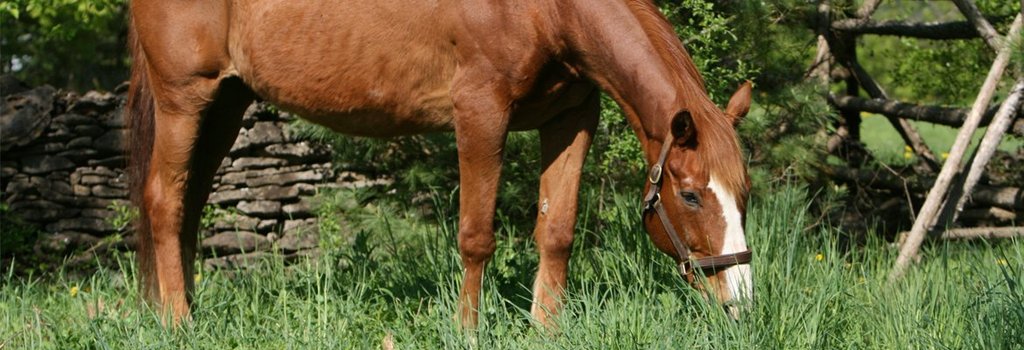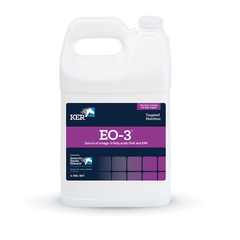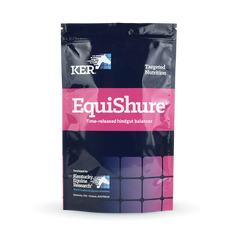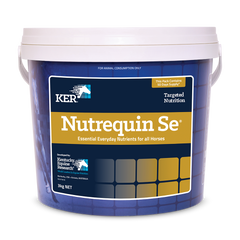Senior

With good care, many horses live well into their twenties or even thirties. At what age is a horse considered geriatric? It depends on the individual because some horses age more gracefully than others. A general rule is that a horse 18 to 20 years of age is entering the golden years. Some horses remain in excellent body condition and health until the moment they die, while others deteriorate quickly or slowly over time. Until notable signs of aging are seen, most horses may be managed as normal for their particular role, be it performance, breeding, or grazing idly in a field. Because of the physiological changes normally associated with aging, geriatrics may require special adaptations in health care, environment, and diet.
Managing senior horses typically involves all of the typical horse management concerns along with additional consideration for changes in digestive efficiency, age-related diseases such as Cushing’s, mobility, and comfort level. A lifetime of activity naturally leads to some level of joint degeneration, and older horses, like humans, tend to be a bit less spry and somewhat more fragile than their younger counterparts.
Additionally, the digestive tract may be affected by lifelong exposure to parasites or chronic conditions such as hindgut acidosis, both of which may leave permanent scarring in the delicate absorptive tissues of the intestines. Normal degeneration of the digestive tract also occurs with age. The result is a digestive tract that gradually loses its ability to absorb nutrients from feed. Compounding the possibility of reduced absorptive ability is age-related dental deterioration. Poor dentition leads to inadequate mastication of feed, resulting in large food particles that are not broken down sufficiently for digestive enzymes and microbes to effectively digest the feed, thereby further decreasing feed efficiency. Digestive tract support to reduce the risk of hindgut acidosis or gastric ulcers often may be indicated for geriatric horses, especially when feeding significant quantities is necessary for the maintenance of adequate body condition or when reduced digestive efficiency is a concern.
Senior horses may suffer from conditions that produce chronic pain such as arthritis, gastric ulcers, navicular disease, and laminitis. Dealing with pain can impact appetite and metabolic rate, and cause horses to lose weight. For this reason, supporting joint health and promoting reduced inflammation are recommended to help these horses continue thriving throughout their golden years.
Which solution is right for your horse?
EO-3™ Concentrated direct source of DHA and EPA omega-3 fatty acids. EO-3 is a rich source of the long-chain omega-3 fatty acids DHA and EPA in a palatable liquid form. EO-3 can be fed to all classes of horses including foals, breeding stock, and performance horses to improve the critical ratio of omega-3 to omega-6 fatty acids in the diet.
EquiShure® Time-released hindgut balancer. EquiShure promotes normal digestive function by aiding in the maintenance of an optimal hindgut environment and is designed for horses suspected of suffering from or that are at risk of developing hindgut acidosis.
Glucos-A-Flex® Help maintain joint health for long term performance. Glucos-A-Flex contains a blend of glucosamine hydrochloride (HCl), vitamins, minerals, amino acids, and antioxidants. This blend of nutrients is vital for cartilage and bone development, maintenance of elastic connective tissue, support of skin and mucous membranes, along with coat and hoof integrity.
Gold Pellet® The ultimate vitamin, mineral and amino acid supplement for horses. Gold Pellet has been scientifically formulated to contain essential nutrient levels to meet requirements for work or growth, and is designed to complement a traditional diet of grains and roughage.
Nutrequin Se® Essential everyday nutrients for all horses. Nutrequin Se is an exceptional value-for-money vitamin, mineral, essential amino acid, and antioxidant formula, specifically designed to supplement horses on home-mixed diets or those consuming forage-only diets.
Synovate HA® Premium joint supplement. Synovate HA delivers high molecular weight sodium hyaluronate in an easy-to-use liquid.
Learn More
- Nutritional Management of the Older Horse
- New Data on Inflammaging in Senior Horses
- Older Horses: Monitor Teeth, Weight, and Diet
- Age-Related Changes of the Equine Gastrointestinal Tract
- Old Horses and Gastrointestinal Disease
- Don't Neglect Hoof Care for Senior Horses
- Equine Cushing’s Disease: Back to Basics
- Exercise and the Older Horse
- Soundness in Senior Horses
- Quidding and Teeth Dysfunction in Old Horses
- Q&A: Feeding an Overweight Older Horse












